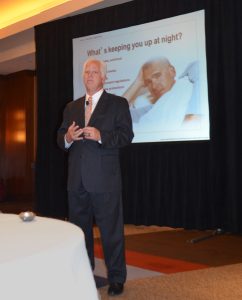
If there ever was any doubt about what are the biggest threats to independent recruiters and to the profession as a whole, Jonathon Thom straightened that out this morning.
Although he didn’t quite put it this way, he might as well have quoted Pogo: “We have met the enemy and he is us.”
In his hour-long keynote here opening the second day of the 2013 Fordyce Forum, Thom listed the “Top 5 Threats Facing Staffing and Recruiting.” These are, he said:
- Inability to Innovate.
- Losing Your competitive advantage.
- Globalization and Consolidation.
- Poor leadership and communication.
- Regulatory nightmares.
Of the five, four are squarely in the lap of owners and agency leaders. Declared, Thom, vice president, professional staffing,Express Employment Professionals, “The post recession economy requires a different set of skills than we needed in the past… We need to be very fluid… We have to innovate and do a better job of communicating what we do not only with the clients we sell to, and the candidates, but with our own people.
“A very big piece of our future depends on changing and adapting.”
Asking the audience to show how many had open recruiter seats, Thom noted that so many hands went up that, “This is costing millions just in this room.” Recruiting and retaining recruiters is an industry weakness, he said, that not only costs every agency money to train and the lost productivity until the new hire gets up to speed, but turnover has a negative effect on client relationships.
Thinking strategically is critical to the success of every agency, he said, using recruiter hiring as an example. Every owner who plans to add a recruiter next year should be doing that now. From the time a new hire starts, it takes no less than 90 days for them to start producing. “What are you doing today to grow?” he asked.
At the same time, too many firms have deadwood; employees who “quit and stay.” These disengaged are minimally productive, and hold back agency growth. Likewise, Thom pointed out, clients also have employees who quit and stay; and disengaged workers and others who, when the time is right, will quit. That presents an opportunity for recruiters to probe clients about these workers as they consult about the organizational costs of the deadwood.
However, retention of productive employees presents other problems. Money, Thom said, is not the only motivator. Citing a survey that shows only a fifth of workers change jobs just for more money, he suggested that owners and leaders talk with their producers to find what drives them and how they feel about what they do.
“Do you know what it’s like to work for you?” he asked. “Find out.”
Globalization of business is a trend with no turning back. But that presents opportunities even for smaller firms. Reshoring of jobs from overseas means new jobs in some communities. It’s important for recruiters to know what is occurring and to think about how to leverage these opportunities. “Will the reshoring of production jobs help your business?”
“We need to innovate, just as our clients do. We have to look at what we do to see if there aren’t things we can do better to be more competitive,” he said. “Change is happening.”
The Fordyce Forum concludes at noon today.